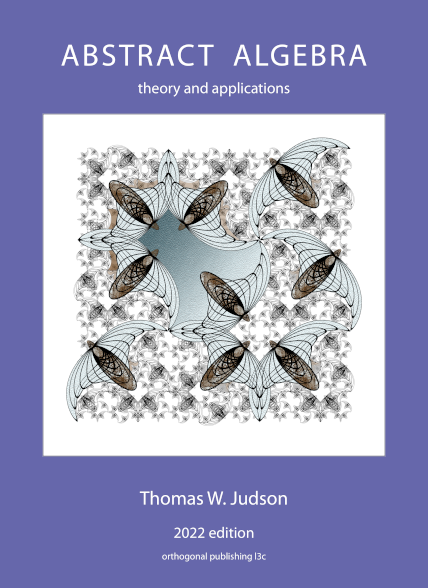Exercises 15.4 Exercises
1.
What are the orders of all Sylow \(p\)-subgroups where \(G\) has order \(18\text{,}\) \(24\text{,}\) \(54\text{,}\) \(72\text{,}\) and \(80\text{?}\)
2.
Find all the Sylow \(3\)-subgroups of \(S_4\) and show that they are all conjugate.
3.
Show that every group of order \(45\) has a normal subgroup of order \(9\text{.}\)
4.
Let \(H\) be a Sylow \(p\)-subgroup of \(G\text{.}\) Prove that \(H\) is the only Sylow \(p\)-subgroup of \(G\) contained in \(N(H)\text{.}\)
5.
Prove that no group of order \(96\) is simple.
6.
Prove that no group of order \(160\) is simple.
7.
If \(H\) is a normal subgroup of a finite group \(G\) and \(|H| = p^k\) for some prime \(p\text{,}\) show that \(H\) is contained in every Sylow \(p\)-subgroup of \(G\text{.}\)
8.
Let \(G\) be a group of order \(p^2 q^2\text{,}\) where \(p\) and \(q\) are distinct primes such that \(q \nmid p^2 - 1\) and \(p \nmid q^2 - 1\text{.}\) Prove that \(G\) must be abelian. Find a pair of primes for which this is true.
9.
Show that a group of order \(33\) has only one Sylow \(3\)-subgroup.
10.
Let \(H\) be a subgroup of a group \(G\text{.}\) Prove or disprove that the normalizer of \(H\) is normal in \(G\text{.}\)
11.
Let \(G\) be a finite group whose order is divisible by a prime \(p\text{.}\) Prove that if there is only one Sylow \(p\)-subgroup in \(G\text{,}\) it must be a normal subgroup of \(G\text{.}\)
12.
Let \(G\) be a group of order \(p^r\text{,}\) \(p\) prime. Prove that \(G\) contains a normal subgroup of order \(p^{r-1}\text{.}\)
13.
Suppose that \(G\) is a finite group of order \(p^n k\text{,}\) where \(k \lt p\text{.}\) Show that \(G\) must contain a normal subgroup.
14.
Let \(H\) be a subgroup of a finite group \(G\text{.}\) Prove that \(g N(H) g^{-1} = N(gHg^{-1})\) for any \(g \in G\text{.}\)
15.
Prove that a group of order \(108\) must have a normal subgroup.
16.
Classify all the groups of order \(175\) up to isomorphism.
17.
Show that every group of order \(255\) is cyclic.
18.
Let \(G\) have order \(p_1^{e_1} \cdots p_n^{e_n}\) and suppose that \(G\) has \(n\) Sylow \(p\)-subgroups \(P_1, \ldots, P_n\) where \(|P_i| = p_i^{e_i}\text{.}\) Prove that \(G\) is isomorphic to \(P_1 \times \cdots \times P_n\text{.}\)
19.
Let \(P\) be a normal Sylow \(p\)-subgroup of \(G\text{.}\) Prove that every inner automorphism of \(G\) fixes \(P\text{.}\)
20.
What is the smallest possible order of a group \(G\) such that \(G\) is nonabelian and \(|G|\) is odd? Can you find such a group?
21. The Frattini Lemma.
If \(H\) is a normal subgroup of a finite group \(G\) and \(P\) is a Sylow \(p\)-subgroup of \(H\text{,}\) for each \(g \in G\) show that there is an \(h\) in \(H\) such that \(gPg^{-1} = hPh^{-1}\text{.}\) Also, show that if \(N\) is the normalizer of \(P\text{,}\) then \(G= HN\text{.}\)
22.
Show that if the order of \(G\) is \(p^nq\text{,}\) where \(p\) and \(q\) are primes and \(p>q\text{,}\) then \(G\) contains a normal subgroup.
23.
Prove that the number of distinct conjugates of a subgroup \(H\) of a finite group \(G\) is \([G : N(H) ]\text{.}\)
24.
Prove that a Sylow \(2\)-subgroup of \(S_5\) is isomorphic to \(D_4\text{.}\)
25. Another Proof of the Sylow Theorems.
-
Suppose \(p\) is prime and \(p\) does not divide \(m\text{.}\) Show that
\begin{equation*} p \nmid \binom{p^k m}{p^k}\text{.} \end{equation*} Let \({\mathcal S}\) denote the set of all \(p^k\) element subsets of \(G\text{.}\) Show that \(p\) does not divide \(|{\mathcal S}|\text{.}\)
Define an action of \(G\) on \({\mathcal S}\) by left multiplication, \(aT = \{ at : t \in T \}\) for \(a \in G\) and \(T \in {\mathcal S}\text{.}\) Prove that this is a group action.
Prove \(p \nmid | {\mathcal O}_T|\) for some \(T \in {\mathcal S}\text{.}\)
Let \(\{ T_1, \ldots, T_u \}\) be an orbit such that \(p \nmid u\) and \(H = \{ g \in G : gT_1 = T_1 \}\text{.}\) Prove that \(H\) is a subgroup of \(G\) and show that \(|G| = u |H|\text{.}\)
Show that \(p^k\) divides \(|H|\) and \(p^k \leq |H|\text{.}\)
Show that \(|H| = |{\mathcal O}_T| \leq p^k\text{;}\) conclude that therefore \(p^k = |H|\text{.}\)
26.
Let \(G\) be a group. Prove that \(G' = \langle a b a^{-1} b^{-1} : a, b \in G \rangle\) is a normal subgroup of \(G\) and \(G/G'\) is abelian. Find an example to show that \(\{ a b a^{-1} b^{-1} : a, b \in G \}\) is not necessarily a group.
